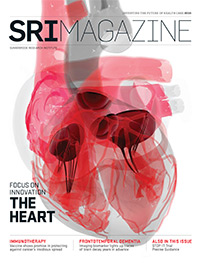- Bleeding Heart
- A New Dawn for Cardiac Imaging
- Keeping the Beat
- HOT: The Heart Outcomes Team Is Steering Prevention, Practice and Policy
- Unplugged
- Vascular Vulnerability
- An Unconventional Method
- Of Life and Limb
Other Features
- STOP-IT Trial Shows Short Course of Antibiotics Safe for Treating Intra-Abdominal Infections
- Illuminating Frontotemporal Dementia
- Immunotherapy
- Precise Guidance
Messages
Ask a Scientist
What Is the Greatest Challenge Facing Science?
Three scientists weigh in on what’s weighing research down
Edited by Stephanie Roberts
JoAnne McLaurin
Reproducibility. It may seem ludicrous that science, an exacting field, has reproducibility problems. Yet, however exacting an individual, laboratory or country, there are factors outside of one’s control. Reagent variability as a result of lot-to-lot variability, company acquisitions leading to alterations in production or lack of industry standardization leads to variable results and lost time spent trying to determine the cause. I have noted that hidden within every successful experiment is a detail that defies a written explanation. This is easily communicated within a laboratory in which techniques are shared between members. However, it can create reproducibility problems among laboratories, institutions and countries. Other technical fields have developed apprenticeship programs to circumvent this problem, and science should not be excluded from such a system. Science is a global collaboration with ready electronic communication among laboratories and countries. Access to an in-person training experience has lagged behind other fields, however, and requires support from government, philanthropists and private organizations to facilitate knowledge transfer.
Dr. McLaurin is developing small molecule therapies that target the toxic protein aggregates commonly found in the brains of patients with neurodegenerative disorders. One of her drug discoveries is in clinical trials to treat neuropsychiatric symptoms of Alzheimer’s disease. She is also working on improved methods to diagnose and track the formation of these protein aggregates.
Meaghan O’Reilly
I think the issue of financial support will always be a major challenge for science. Funding opportunities are highly competitive and, unfortunately, there are typically more great research ideas than there is money to go around. Further, what is researched is heavily dictated by what opportunities are available—it’s not enough to have a brilliant research idea if there is no funding body interested in the work. For an individual scientist to have the best chance at success they need to be able to adapt their work to align with the interests of the funding bodies, but without sacrificing the unique aspects that define their research program. In the bigger picture, for science to survive, we must continue to convince the funding bodies, and ultimately the public, that research remains a worthwhile investment.
Dr. O’Reilly is using microbubbles and focused ultrasound to deliver drugs across the blood-brain barrier. She has optimized techniques to monitor and control microbubble activity to ensure that drug delivery is targeted and effective. Her focus is primarily on the physics and engineering aspects. She is also applying these approaches to the spine and treatment of spinal cord diseases, using her expertise to tackle the challenges posed by the geometry of the spinal column, which is more complex than the skull.
Robert Screaton
The major challenge facing health science today is insufficient financial support. Canadians overwhelmingly recognize research as critical to health care, yet the main federal funding mechanisms for biomedical research have been reorganized to support preferentially targeted areas, with a focus on the “applied” end of the spectrum. While applied research is important, it should not come at the expense of providing consistent support for outstanding curiosity-based research in Canada that is recognized as such internationally. History shows that transformative discoveries stem from curiosity-based research, and that groundbreaking work requires taking risks. Being able to take risks requires a steady stream of operating funds, which should properly be viewed as investment in the resulting intellectual property, training of the next generation of researchers and novel therapies. My concern is that if the current trend continues, we may find ourselves revisiting the "brain drain” era, with leading Canadian scientists once again looking elsewhere to set up shop.
Dr. Screaton studies how cells communicate with each other to respond to their environment and ensure their survival and function. Among his research interests are pancreatic beta cells that produce and secrete insulin and mitochondria, the energy generator of the cell. One project focuses on pancreatic beta cells and how they sense and respond to changing blood sugar levels.
Photos: (Left) Eleni Kanavas / (Centre) Courtesy of Dr. Meaghan O’Reilly / (Right) Courtesy of Dr. Robert Screaton



- << Connected |
- Previous: Quick Statistics
- |Through the Wormhole >>






